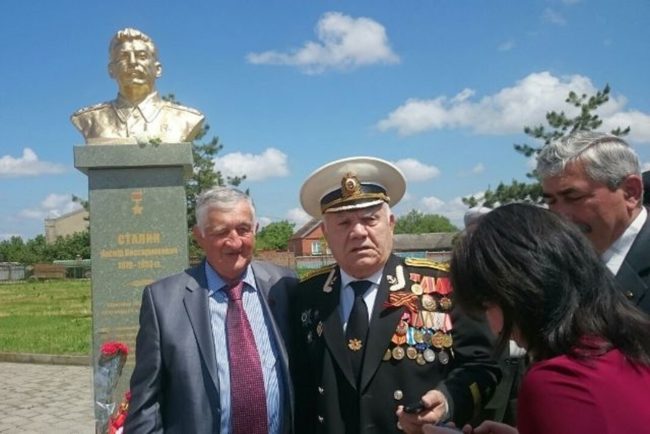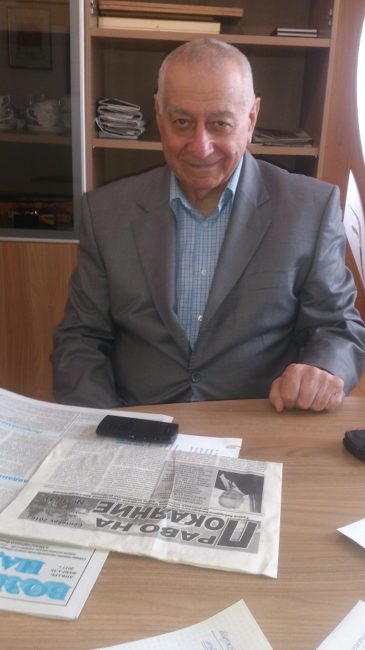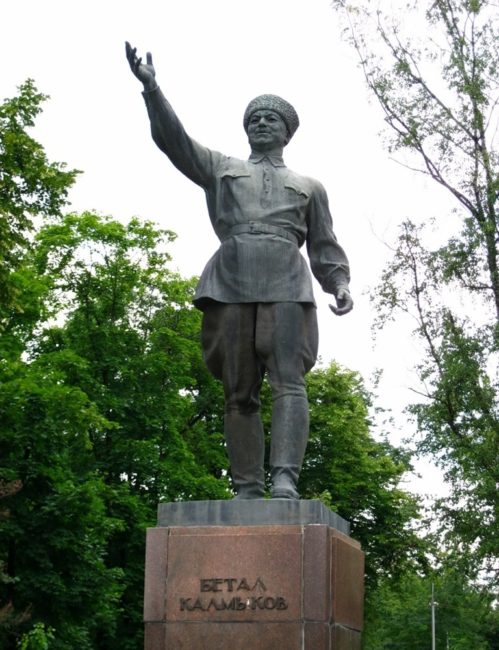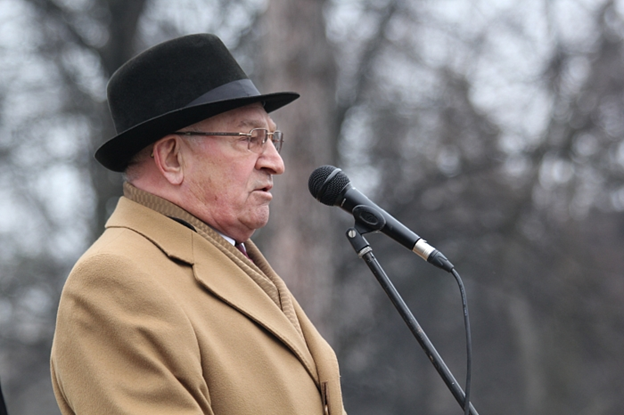No support and no understanding for victims of Stalin’s repressions in Kabardino-Balkaria


 Inhabitants of Kabardino-Balkaria who were subjected to political repressions in 1930s and 1940s believe that Russia is returning to Stalin’s era.
Inhabitants of Kabardino-Balkaria who were subjected to political repressions in 1930s and 1940s believe that Russia is returning to Stalin’s era.
According to the Ministry of Internal Affairs of Kabardino-Balkaria, there are currently 57,000 people in the republic who suffered from repression in the period from the late 1920s to early 1950s. This figure includes those who suffered reprisals for class and political reasons, family members affected by collectivisation, victims of the 1944 mass deportations, as well as people accused of being Nazi collaborators after Germany’s defeat.
Stigma of a traitor
Khamid Guchev was born in 1942 in the city of Baksan, Kabardino-Balkaria, to an intelligentsia family. His grandfather was a mullah. As he had his own farmstead, he was first deprived of electoral rights, and later, in the 1930s — almost all of his property. Khamid’s father, Abu, studied Circassian folklore, but in 1937 he was arrested on charges of ‘bourgeois nationalism’ and spent two years in prison. When the Second World War began and the Wehrmacht seized the Caucasus, Abu Guchev and his family couldn’t be evacuated and stayed in the occupied territory.
‘Understanding that all of us would be repressed for the “sins” of the past and for “staying with the Germans”, my father and us left with the German army’, Khamid told OC Media. ‘Together with a thousand countrymen, we passed through Taman, Crimea, Ukraine, Belarus, and eventually ended up in a refugee camp in Austrian Tyrol on the River Drau. In May 1945, our family, together with other Caucasians and Cossacks, was handed over to the Soviets by the British occupational authorities.’
Khamid Guchev was only three years old at the time, and recalls this story based on what his late older brother had told him. After the extradition, Abu was sentenced to ten years in Kolyma’s labour camps. His family, including the young children, was first placed in a prison camp in the Krasnoyarsk Krai in Siberia, and then in special settlements in Kazakhstan and Uzbekistan. Abu died in the camp, never seeing his family again. Khamid and his family returned to the Caucasus only in 1958 — after Stalin’s death and the ‘rehabilitation’, which was merely a declaration. Neither Khamid, nor his brother and sister could find a job anywhere.
‘Mother had a pension — ₽10! (today, approximately $15). She earned money by working at home as a tailor, for which she was repeatedly harassed by the police’, Khamid recalls, adding that this kind of activity was equated with private enterprise, which was prosecuted by law.
Only in the late 1960s, when the state’s attitude towards the repressed eased, did Khamid manage to enroll in university in Kabardino-Balkaria and get a builder’s degree. Around the same time, his siblings received an education, too — his brother became an agronomist and his sister became a librarian.
However, local authorities continued to persecute the Guchev family in every possible way, forcing them to split up. Khamid’s older brother left to Karachayevo-Cherkessia where he finally managed to find a suitable job, while his sister worked her whole her life in a school library in Baksan for a beggarly salary. Khamid also remained in Kabardino-Balkaria, but moved to Nalchik, where he worked his whole life at various construction sites — as a worker, master, or foreman. He received an apartment only at the end of his working life. His family of five (he had three children by then) was forced to settle in a small 1.5-room flat in a dilapidated house with practically no communal facilities. Khamid, his youngest son, and his children live in the flat today. Because he never worked in one place for a long time, his pension is only slightly over ₽6,000 ($105) a month.
‘Sometimes I wonder what would’ve happened to my father if he had listened to some of his fellow countrymen and fled to the American zone of occupation, for example to Italy’, Khamid said. ‘Probably, everything would’ve been different. But I understand that my father could not do this, because he had me — a three-year-old child — and his mother, exhausted by constant wandering, a wife, a young brother, and a sister. My great grandmother, I remember, spoke of our country only as qeral ughursyz — Balkar for “evil power”. Now, I tell my grandchildren: “You have no perspectives here, try to go somewhere, like to Canada, the United States, or Australia, where you can work normally and live normally”. But they’re young and they still hope for a change for the better. I don’t hope for anything!’
According to Marks Shakhmurzov, who has headed the branch of the Association of Victims of Political Repressions in Kabardino-Balkaria since 1998, the figure of 57,000 registered victims also includes people born before 1957 in places of exile and in forced labour camps. The age of 12,000 of them exceeds 73 years. However, only 860 people are members of the Association.
‘They are the most active group’, Marks told OC Media. ‘These are the people who took direct part in events, sign petitions and appeals, etc. But we deal with the problems of all those who were illegally repressed.’
Discrimination on a territorial basis
The repressed people, who receive meagre benefits from the state, are forced to manage their everyday problems either on their own or with the help of NGOs. Their financial situation has significantly deteriorated since the adoption of the 2004 law on monetisation of benefits by the Russian State Duma, according to which benefits for illegally repressed citizens are now paid from regional budgets, the size of which varies. Rich regions, such as Moscow, St Petersburg, Tatarstan, and Bashkortostan, are able to pay more than, for example, Kabardino-Balkaria, Ingushetia, or Karachayevo-Cherkessia. If a republic is subsidised, then its leadership can, at its discretion, either minimise or abolish all benefits altogether.

‘In Kabardino-Balkaria, an allowance for an illegally repressed citizen consists of transportation costs, ₽780 ($14) a month, and 50% of utility bills, from ₽500–₽1,000 ($9–$18) a month’, Marks Shakhmurzov told OC Media.
In comparison, according to the Russian Pension Fund in Kabardino–Balkaria, the average pension in the republic is ₽9,579 ($170), which is ₽650 ($12) less than the average for the North Caucasus Federal District, and ₽2,500 ($44) less than the average for the Russian Federation.
At the same time, in rich regions, illegally repressed citizens have retained their privileges for annual free treatment in any health facilities in Russia with free round-trip travel, as well as some others which existed prior to 2004. This shows that the citizens of Kabardino-Balkaria, and many other regions, who suffered from Soviet arbitrariness in the 1920s–1950s, are now subjected to discrimination on a territorial basis.
‘If we take into account that the specified pensions for Kabardino-Balkaria is only nominally average, if we also take into account that there is virtually no free medicine in the republic, and if we add the continuously rising prices of medicines and essential products, it is not hard to imagine how hard life must be for this category of citizen in Kabardino-Balkaria’, Shakhmuzov said.
Despite this state of affairs, the local branch of the association is trying to help the repressed as best as it can. The conversation with the head of the association made it clear that its work is based on sponsorship from individual representatives of the business community, officials, and private donations.
Reluctance to abandon the Bolshevik ideology is the root of evil
Nevertheless, despite the help of individual sponsors and benefactors, this category of citizens in Kabardino-Balkaria is experiencing great problems with regard to medical care. The local branch of the Russian Association of Victims of Political Repressions is very often approached by elderly people who are denied the necessary medical care and even hospitalisation, on various pretexts. Shakhmurzov said that not long ago, he had to involve the Prosecutor’s Office in order to have an 80-year-old man admitted to a state hospital.
‘There are, of course enough material problems for illegally repressed people in Kabardino-Balkaria’, Shakhmurzov said, ‘and they are most acute for people who are elderly or ill. However, the root of evil, it seems to me, is the reluctance of the authorities to abandon the old Soviet ideology. Recently, there has been a clear trend in the official media to push for political and moral rehabilitation of such odious personalities as Stalin, [Nikolay] Yezhov, [Lavrenti] Beria, and many other bloody executioners. Today, TV, radio, and the press characterise them as successful managers and statesmen, while their atrocities, like in the era of Stalinism, are being justified by political necessity.’
Monuments to executioners

For many years, NGOs in Kabardino-Balkaria have demanded the removal of a monument to Betal Kalmykov, who was responsible for implementing Stalin’s policy of repression in the republic, the victims of which became thousands of Kabardians and Balkars. Recently, this monument was removed from the pedestal, but, according to Shakhmurzov, it was removed only for restoration purposes and will soon be installed again.
‘We believe that the street names named after such Bolshevik and military leaders as [Dmitry] Vidyaykin, [Nikolay] Zakharov, [Mikhail] Kalinin, [Kliment] Voroshilov, Pavlik Morozov, and others, should be renamed’, Shakhmurzov said.
The leadership of the association sent a request to the administration of Nalchik to hold a meeting on 27 May near the pedestal of the monument to Betal Kalmykov. However, the rally was banned. The mayor’s office said that it would only be possible to hold it on 17 June in Nalchik’s outer suburb of Iskozh. This has greatly upset activists, since the area has no symbolic objects or the right conditions for organising a mass event.
Still, the activists intend to raise the issue of removing the monument and instead, installing six memorial plates with the names of the citizens of Kabardino-Balkaria exterminated by the Bolsheviks.
In Kabardino-Balkaria, as in all other regions of the Russian Federation, public chambers have existed for several years, which are supposed to solve similar issues and to bring public opinion to the authorities. However, in the opinion of Shakhmurzov and the overwhelming majority of civil society activists, the local Public Chamber doesn’t fulfil its functions in the republic.
‘The Public Chamber in Kabardino-Balkaria is merely a “signboard”. It is a body obedient to the authorities, the “activity” of which is financed from the republic’s budget. Last year, its maintenance cost ₽13 million ($230,000). I think that this money could be channelled into real help to citizens who need it, including those who were illegally repressed’, Shakhmurzov told OC Media.
Divide et impera, or the land issue
The problem of the full rehabilitation of the Balkar people, who were deported in 1944, is an especially important one for the republic’s branch of the Russian Association of Victims of Political Repression, as well as other local NGOs and human rights defenders. The chairman of the Council of Elders of the Balkar people, Ismail Sabanchiyev told OC Media about the most accute issues connected to the rehabilitation.
‘Despite the decree of 1957, which proclaimed full economic, political, and territorial rehabilitation of Balkars, all of it hasn’t happened so far’, Sabanchiyev said.

‘Of the 32 enterprises operating on the territory of Balkar regions of the Kabardino-Balkarian ASSR and liquidated after the deportation, none have been restored. Over thirty collective farms, which produced 50% of all livestock production in the republic, ceased to exist. 20,000 hectares of public lands that were in use by these farms were illegally purchased by new owners or given to the so-called tourist cluster’, Sabanchiyev said.
[Read on OC Media about the problems of farmers in Kabardino-Balkaria: When the ground slips out from under the feet]
‘This situation suits Moscow, which can always use the land issue to set Balkars and Kabardians against each other’, Sabanchiyev said. ‘In its nationality policies, Russia has not yet abandoned the principle of divide et impera (divide and rule), while its governors from among the comprador bourgeoisie and local officials, bypassing all existing laws, deprive the indigenous peoples of Kabardino-Balkaria of the basic means to existence — their land.’
Sabanchiyev believes that if the authorities continue to ignore this problem, the future generation of Kabardians and Balkars will simply remain without a homeland and will completely dissolve in a foreign linguistic and cultural environment.





